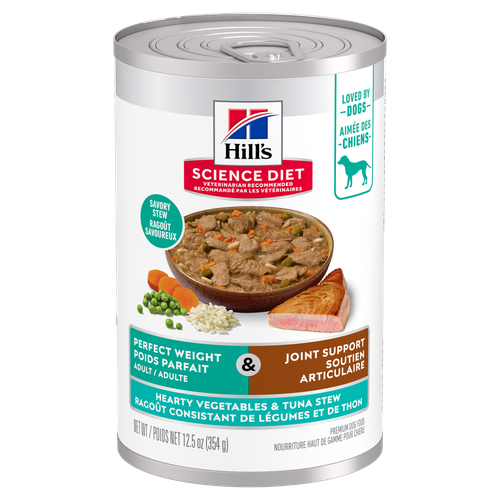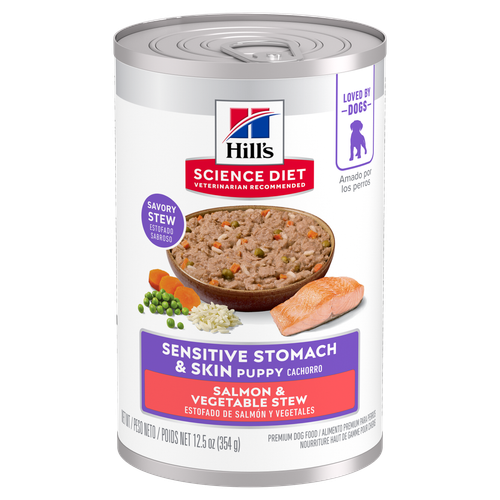
-
Find the right food for your petTake this quiz to see which food may be the best for your furry friend.Find the right food for your petTake this quiz to see which food may be the best for your furry friend.Featured products
 Adult Perfect Weight & Joint Support Hearty Vegetables and Tuna Stew Dog FoodShop Now
Adult Perfect Weight & Joint Support Hearty Vegetables and Tuna Stew Dog FoodShop Now Healthy Cuisine, Adulte, assortiment de conserves
Healthy Cuisine, Adulte, assortiment de conservesHill's Science Diet Healthy Cuisine Variety Pack
Shop Now Sensitive Stomach & Skin, assortiment de conserves
Sensitive Stomach & Skin, assortiment de conservesHill's Science Diet Sensitive Stomach & Skin Variety Pack
Shop NowFeatured products Perfect Weight Salmon & Vegetable Canned Cat Food
Perfect Weight Salmon & Vegetable Canned Cat FoodOver 70% of cats lost weight within 10 weeks when fed this nutrition
Shop Now Adult Chicken & Spinach Casserole Cat Food
Adult Chicken & Spinach Casserole Cat FoodWith delicious chunks in a decadent gravy
Shop Now Adult 7+ Tender Chicken Dinner Cat Food
Adult 7+ Tender Chicken Dinner Cat FoodWith delicious chunks in a decadent gravy
Shop Now -
Dog
- Dog Tips & Articles
-
Health Category
- Weight
- Food & Environmental Sensitivities
- Urinary
- Digestive
- Joint
- Kidney
- Dental
- Cancer
-
Life Stage
- Puppy Nutrition
- Adult Nutrition
- Senior Nutrition
Cat- Cat Tips & Articles
-
Health Category
- Weight
- Skin & Food Sensitivities
- Urinary
- Digestive
- Kidney
- Dental
- Stress
- Cancer
-
Life Stage
- Kitten Nutrition
- Adult Nutrition
Featured articles Compare Your Pet Food's Calories to Other Brands
Compare Your Pet Food's Calories to Other BrandsCompare Hill's Science Diet dog and cat food's calories against other pet food brands and AAFCO recommended maximum calorie count.
Read More Pet Food Storage Tips
Pet Food Storage TipsDiscover how and where to store your dry, as well as canned, dog and cat food. Learn how to find the "best before" dates on all Hill's pet food packaging.
Read More The Incredible Science Behind Your Pet's Microbiome
The Incredible Science Behind Your Pet's MicrobiomeLearn what a pet's microbiome is, how it contributes to your pet's gut & overall health, and why nutrition is important in maintaining healthy microbiomes.
Read More -


Anatomically speaking, a torn ACL in dogs is the same condition in humans, which happens when the anterior cruciate ligament of the knee suffers a loss of its integrity. In dogs, this condition is referred to as a cranial cruciate ligament tear (CCL) tear or, more generally, as cruciate ligament disease, explains the American College of Veterinary Surgeons. While many treatment options are available, the tibial-plateau-leveling osteotomy (TPLO) surgery is the most common approach to treating this condition.
Comparing Dog CCL Tears to Human ACL Tears (& Why They Happen)
While a torn ACL in humans is largely a result of traumatic events, a torn CCL in dogs is more likely to happen as a result of a progressive weakening of the ligament. As the ligament degenerates, small tears can occur, eventually leading the ligament to rupture and causing instability in the joint and an inability to successfully bear weight.
With each progressive tear, the joint becomes more inflamed. This process ultimately results in osteoarthritis.
Signs of a Torn CCL
A torn CCL in dogs may seem to come on suddenly, but in most cases the ligament has been weakening for months. Once limping is observed, pet parents tend to notice a pattern of chronic intermittent lameness lasting for 48 to 72 hours. The limping can be severe or mild.
Here are additional signs that your dog might have a torn CCL:
- Mild to severe weakening of the thigh muscles in the affected limb
- Thickening of the bony part of the affected knee
- A decreased range of motion in the affected knee
- An asymmetric sitting posture in which the lower part of the limb is angled away from the body
Some of these signs can be very subtle to nonexistent. Overt pain is not a common sign of a torn CCL. While the knee may be uncomfortable to move, lameness may be due to instability rather than discomfort.
Risk Factors
While it's impossible to know whether any individual dog will grow up to tear their CCL, some dogs are more likely to suffer CCL disease than others. Affected dogs are typically middle-aged and hail from larger breeds. According to research published in the journal Acta Veterinaria Brno, breeds at a higher risk of tearing their CCL include Labrador retrievers, Rottweilers, American cocker spaniels, chow chows, German shorthaired pointers, American Staffordshire terriers and Brazilian mastiffs. Some research indicates that this is one of the few conditions that may be more prevalent among mixed-breed dogs.
Interestingly, dogs who are neutered or spayed are more likely to experience a torn cruciate ligament. Additionally, females appear slightly more predisposed to the condition than males. Excess weight is also a risk factor.

Diagnosis & Treatment for CCL Injuries
Vets diagnose a torn CCL through physical examination, joint manipulation and X-rays. In most cases, dogs must be sedated for the exam and radiography to take place.
While TPLO surgery is the most common recommendation for a dog with a torn CCL, there are other surgical options, including:
- Simitri Stable in Stride
- Tibial tuberosity advancement (TTA)
- CORA-based leveling osteotomy (CBLO)
A great many dogs, however, will never receive surgery. Research in The Journal of Bone & Joint Surgery has shown that surgery may not even be indicated. Consequently, conservative approaches are now being more closely studied. These include:
- Weight loss
- Strict rest
- Anti-inflammatory medication
- Nutritional supplements
- Properly balanced nutrition formulated for joint health and weight loss
- Physical therapy
If a CCL rupture is diagnosed, your veterinarian will provide you with their recommendation for the best course of action, and whether surgery will be necessary or not.


Tasty Tips
TPLO Surgery
The TPLO surgery involves the use of an implant to stabilize the knee. A cut is made in the shinbone, which is rotated slightly to change the natural angle of force on the knee. A specially devised plate is then applied to the outside of the knee to stabilize the entire mechanism.
It's important to recognize that the TPLO surgery, as with all surgical procedures, is best undertaken by a surgeon who performs many similar procedures. Finding a board-certified surgeon who frequently performs the TPLO surgery will likely yield a better outcome for your dog.
Recovery from a TPLO surgery can be surprisingly swift. Some dogs are able to bear weight almost immediately. All patients benefit from physical therapy. Most dogs will need to take pain medicine and all require an avoidance device, like a cone, to prevent them from interfering with the surgical site. Be strict about limiting your dog's activity level after the surgery. Implant failures, in which the internal mechanism breaks down, are common in active, unsupervised patients. It's also important to understand the underlying cause of the tear in the first place. For instance, overweight dogs puts additional stress on your dog's joints, so your veterinarian will likely recommend that your dog loses weight to avoid potentially rupturing the CCL again. Listen carefully to their advice on how to help your dog lose weight in accordance with their recovery. They might also recommend physical therapy to help strengthen the joint again.
Long-Term Care for Dogs With Cruciate Ligament Disease
It's important to recognize that all dogs with cruciate ligament disease will suffer from osteoarthritis. Some dogs may require long-term physical therapy and lifelong medical management, but good nutrition is often sufficient to manage the condition.
High-quality nutrition is crucial. Your vet may recommend that your dog take nutritional supplements, like fatty acids, glucosamine and/or chondroitin. These are often included in high-quality therapeutic dog foods specifically formulated for joint health.


Dr. Patty Khuly is an award-winning veterinarian known for her independent thinking, her spirited pet advocacy, her passion for the veterinary profession, and her famously irreverent pet health writing.
Dr. K is an honors graduate of both Wellesley College and the University of Pennsylvania School of Veterinary Medicine. She received her MBA at The Wharton School of Business as part of the prestigious VMD/MBA dual-degree program. She now owns Sunset Animal Clinic, a veterinary practice in Miami, Florida.
Related products


Hill's Science Diet Sensitive Stomach & Skin Variety Pack

Gentle on stomachs while nourishing skin & supporting development in growing puppies

Hill's Science Diet Healthy Cuisine Variety Pack
Related articles

Proper nutrition for your pregnant or nursing dog is vital to her and her puppy's health. Learn what you should do provide her with the proper nutrients.

Discover fun and engaging games and other ways to help your dog exercise, keeping him happy and healthy.

Learn how to stop your dog from begging at the dinner table, and understand how it can help contribute to his health.

Gather the following puppy supplies to prepare your family for all the fun (and commitment) that comes with being a dog parent.

Put your dog on a diet without them knowing
Our low calorie formula helps you control your dog's weight. It's packed with high-quality protein for building lean muscles, and made with purposeful ingredients for a flavorful, nutritious meal. Clinically proven antioxidants, Vitamin C+E, help promote a healthy immune system.
Put your dog on a diet without them knowing
Our low calorie formula helps you control your dog's weight. It's packed with high-quality protein for building lean muscles, and made with purposeful ingredients for a flavorful, nutritious meal. Clinically proven antioxidants, Vitamin C+E, help promote a healthy immune system.

